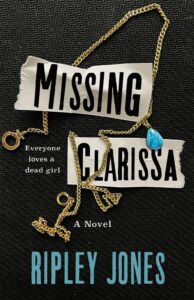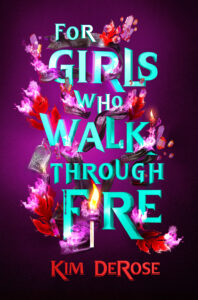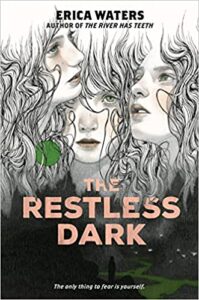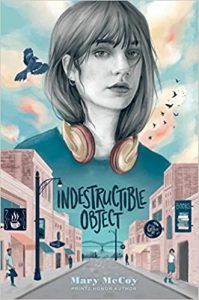Trigger warnings (apply to both books): sexual assault, grooming, minor instances of racism (mostly microaggressions)
Trigger warnings (Missing Clarissa): kidnapping, gun violence
Trigger warnings (For Girls Who Walk Through Fire): ableism, supernatural violence
This past month, I read two books that struck me as remarkably similar. Both were multiple perspective YA books that dealt with themes of sexual assault, justice, and intersectionality. While Young Adult has always had its books willing to tackle difficult and sensitive issues, these two belong to a new wave of intersectional, #MeToo-era lit that is still defining itself as a sub-genre. I will use these two titles as samples to look at what works and what doesn’t with a specifically queer perspective, but also considering each book as a whole.
Missing Clarissa by Ripley Jones is a Nancy Drew story for the 21st century. It follows Cameron and Blair as they create an investigative podcast focusing on a 20-year-old disappearance from their hometown. Cam is the primary main character: big, bold, and messy, she’s all heart and impulse and is very much the driving force behind the narrative. Secondary main character Blair is thoughtful and insecure. As the two investigate Clarissa’s disappearance, they must confront personal bias and journalistic ethics.
For Girls Who Walk Through Fire by Kim DeRose is The Craft meets Promising Young Woman. It focuses on Elliott, a victim of sexual assault who forms a coven with other victims to seek revenge on their attackers. As the girls dedicate themselves to this path, they find that it takes a toll on them in return and ultimately learn that revenge and healing are two very separate things.
Let’s start with queer content. Each book features a queer POV character who comes out during the story. In Missing Clarissa, it’s Cam, who becomes awkward around her crush and usually finds some reason to walk away like the teenage disaster that she is. Their relationship is a little rushed, but it’s sweet, and it fits with this character who throws herself headfirst into everything she deems worth her while. The humor in the book hit home for me. When Cam comes out to her mom and to Blair, both reply that they kind of knew—the Megan Rapinoe wall was a pretty big clue from a girl who doesn’t like soccer!
In For Girls Who Walk Through Fire, it’s Bea. Bea mentions once getting butterflies in her stomach around a girl, Bea later comes out to her friends, and finally Bea is given a passing mention that her family accepts her. Otherwise, we see nothing else of Bea’s queerness; we don’t see her tell her parents, experience attraction, feel represented by other queer women (perhaps because she doesn’t encounter or seek out any). “Good” representation can be subjective. However, I think both the shallowness of the representation itself and Bea’s role in the story make this feel like the author wanted to be inclusive, but didn’t take time to become understanding. Bea is not the main character—that’s Elliott. She isn’t the primary foil—that’s Madeline. It seemed like she was queer only to make a comment on the misconception that a person can be “turned” by sexual assault. This incredibly harmful misconception deserves commentary, but the inclusion here feels more like an effort to be comprehensive than genuine. If the book didn’t have that line, it wouldn’t have made any difference. I thought that was the metatextual reason Bea was gay, in the interest of the book more comprehensively commenting on girls’ experiences of sexual assault. However, Bea’s sexuality was given far less page time than Bea’s experiences as a Black girl or Chloe’s experiences as an adoptee or Elliott’s experiences in a single-parent household. It felt like, in an effort to include as broad a range as possible, the author had to leave some experiences under-developed. I wish she had chosen to represent a few experiences well rather than making this broad, albeit very well-intentioned, effort to include everyone.
This was further complicated because Bea loves Harry Potter. All things in context: loving Harry Potter isn’t a red flag in many circumstances. For Girls Who Walk Through Fire is so determinedly intersectional that centering the works of a prominently transphobic author in the queer character’s narrative makes a resonant statement. Bea’s queer, thus queerness is included; the most prominent queer character has a close, comfortable relationship to this book by an author who actively opposes trans rights. I’m not trans, but on behalf of my trans siblings, this made me uncomfortable.
Inclusivity is another matter worth considering in these books. For Girls Who Walk Through Fire wants you to know how inclusive it is. Only… is it? Yes, two of the supposed main characters are girls of color, but they’re the most underdeveloped main characters who are victims of assault first, and victims of racism second, and people… somewhere in there, I guess. The characters had little personality—and that could be okay. It’s fine to write from a single perspective. But that is not the approach this book takes. It tries to show the lives of all four girls in the coven. Because two of the four supposedly main characters are poorly developed, it feels perfunctory.
In Missing Clarissa, main character Cam is Latina and her love interest is First Nations. Though microaggressions occasionally occur and are addressed, this novel falls squarely into the category of inclusive, not representative—and I see nothing wrong with that. I believe we need books that center questions of identity and books that feature characters who are incidentally diverse, whether that is with regard to race, queerness, or any other category. Writers can include an underrepresented character without defining them by their traits rather than their personhood. Cam is impulsive, determined, well-meaning but terrible at thinking through to the consequences of her actions. She’s caring but insensitive. Bea is anxious. And Black. And gay. And there’s little else to describe about her because most of her page time is dedicated to this shallow approach to inclusivity.
When it comes to disability, too, one book is clearly more thoughtful. Cam from Missing Clarissa is ADHD-coded. Not often one to think before she acts, she often stumbles and, near the end of the book, makes a massive mistake that will have any other impulse-challenged readers like myself wincing in recognition. For Girls Who Walk Through Fire treats disability as a punishment. Literally. Many of the spells inflicted on the rapists amount to making them disabled. Again, context matters: it’s not that the boy is blind, for example, but that he is losing his basketball scholarship because he’s blind. But one instance stands out. Elliott hears about another witch whose attacker is no longer able to control his bladder and walks with a shuffle, and has a moment of essentially wishing to seek him out and laugh at him. This comes from a place of victimhood, but still stings as a disabled reader.
For Girls Who Walk Through Fire deals in dichotomies of power. The dichotomy throughout the narrative is usually between male and female—all the coven members are girls who were assaulted by boys or men. Their attackers enjoy more social and physical power in a world that centers masculinity. When their magic doles out punishments, it often renders their attackers disabled, letting the girls feel stronger. They are now experiencing the world not for which gender is centered, but for how ability is centered. If this had been handled better, the parallels acknowledged of the different social strata, I could have appreciated it. But it’s not. Instead, disability is, by implication, associated with weakness and cruelty.
I don’t mind revenge stories. I’ve watched the entire Saw series, which is a hot mess about a sadistic torturer/killer called Jigsaw who puts people in ironic traps. For Girls Who walk Through Fire could take a few notes. When Jigsaw forces a man to blind himself, it’s both horrific torture and explicitly tied to his voyeurism. When the book does it, well, yes, the boy posted revenge porn, a despicable act. But without the parallels drawn explicitly and within the context of other disabilities “inflicted”, it sends a clear message that being disabled is somehow indicative of immorality.
How do these two books discuss sexual assault? In both cases, with tact. We see the histories of the girls who walk through fire, and each is presented as traumatic and devastating. In Missing Clarissa, Cam and Blair discover that a powerful man has a history of abusing his position to prey on young women. Though they seek out the victims, they recognize what is and is not their story to tell. For Girls Who Walk Through Fire shows how assaults are confusing and horrible for those who experience them; Missing Clarissa shows how outsiders can approach the subject with respect.
Finally, I want to consider the messaging of these two books. For Girls Who Walk Through Fire is a split: half is about revenge, half is about healing. And the revenge is shown to physically poison the coven. At the same time, healing, acknowledging trauma, and coming together is shown as the right course. To me, this felt exceptionally empty, largely as a consequence of the book’s other failings. The characters being poorly developed made them difficult to identify with. Maybe this would be cathartic for victims of assault and I don’t mean to diminish that, but I can only speak for myself, and I felt no investment in these girls. Ultimately, having a character-focused ending without well-developed characters feels hollow. Not only that, the book makes sure to mention failures of the justice system, which is representative of real life… and a further problem. If the message is that seeking revenge won’t help, the justice system won’t help, but victims can find strength through their shared trauma, then the message becomes, yes, some, perhaps many, women will be assaulted, but they’ll find a way to be okay. It’s true, I suppose. But it also seems to put too much responsibility on victims. Similarly, I found it frustrating that each victim was determinedly innocent-coded. Though it acknowledges that women are blamed for their assaults, it doesn’t feature any victims who were drinking, were promiscuous, were doing anything that might earn them social blame. It felt like the narrative was afraid or unwilling to humanize those girls. To become powerful, they have to be victims—the right victims—and they must be, of course, victimized. A hollow and unsatisfying final note disguised as a victory.
Missing Clarissa has a much narrower focus, and because of that, is a much stronger book. It’s about media responsibility, as told through the story of two girl who start a podcast. And yes, one is a queer, neurodivergent Latina who needs to temper her enthusiasm. And yes, one is a shy girl who finds her voice. All of that happens along the way. Most importantly to me, Missing Clarissa knows that life is messy. It knows that people are messy. It knows that human beings can be mean and petty and that doesn’t make us evil, and sometimes, even if you were completely right and your risks found justice, you have to face the consequences of your actions. It’s a more morally complex narrative, for that, a much more satisfying one.
I hope I’ve shown here how similar yet different these two books are. I hadn’t realized I was dipping twice into this budding subgenre, and was struck by how well one book told its story and how poorly another did. Sometimes less is more; often, authors achieve better results by not trying to do everything. I’m glad I read both. But I would only recommend one, and I think you know it’s Missing Clarissa. I look forward to seeing how the story continues in its sequel!




